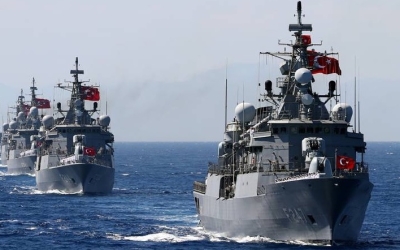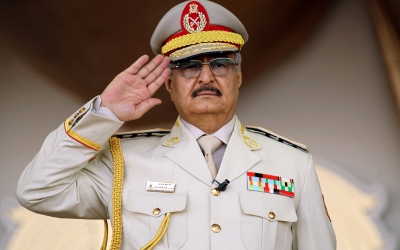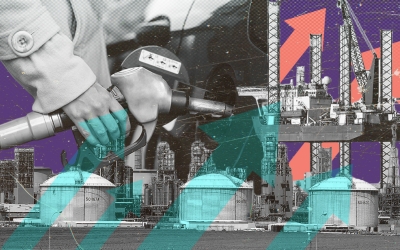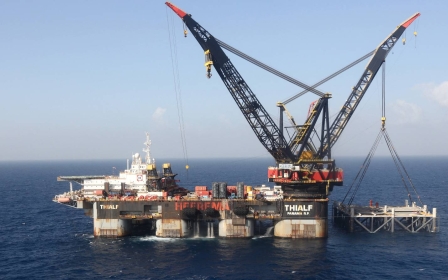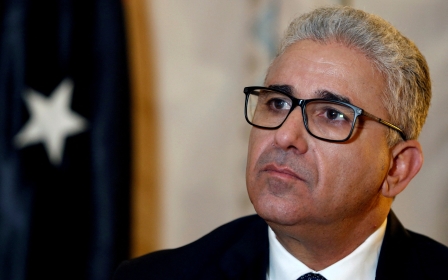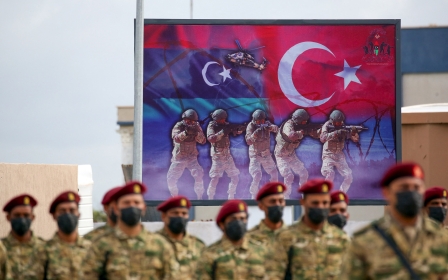Libya-Turkey energy deal 'valid' despite court ruling, oil minister says
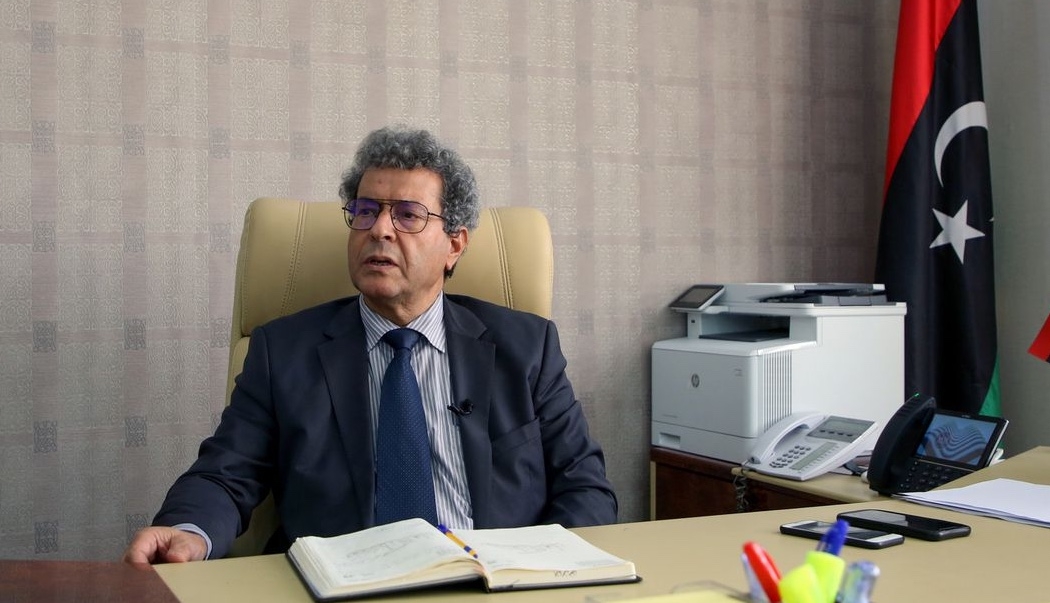
A preliminary energy exploration deal between Libya’s Tripoli-based government and Turkey is “valid” despite a court ruling suspending it, according to Mohamed Aoun, Libya’s oil minister.
In October, Turkey and Libya signed the agreement, a memorandum of understanding, to conduct hydrocarbon exploration in areas of the Eastern Mediterranean disputed with Greece and Egypt. At the time, diplomats told Middle East Eye the agreement risked exacerbating regional disputes over competing maritime zones.
In an interview with MEE, Aoun disputed that the pact was aimed against Libya’s neighbours, saying it had “no negative side effects whatsoever”.
The comments from Aoun, Libya’s former representative to Opec, come despite Libyan media reports during the deal's signing that Aoun's duties as oil minister had been temporarily transferred to Libya's economy minister to ease its passage.
“Because of the enraged political atmosphere [the agreement] has been exacerbated and blown out of proportion,” Aoun said.
“First, it is not an exploration deal, it is an MOU (memorandum of understanding)…Second it is noncommittal, not binding to either party. It is just a letter of intentions, it greatly depends on either parties' plans and anticipation.
“Due to its nature, it is believed that it does not violate any law and thus it is valid," he added.
Troubled waters
The deal, however, has been thrust into fresh uncertainty since its suspension in January by a Libyan appeals court.
Lawyers who submitted the appeal argued it violated Libyan laws governing energy resources and the granting of energy concessions - and that it was detrimental to the interest of Libya.
They also said the hydrocarbon deal ran against the UN-backed reconciliation process which states that Libya's unelected interim government will not consider agreements “that harm the stability of foreign relations of the Libyan state” or impose “long-term obligations on it”.
Aoun argued that the agreement was “definitely” not detrimental to Libya’s future.
“The MOU does not centre on any project in particular. And Libya can, if it wants, sign similar MOUs with other firms and investors,” he said, adding that Turkey had the capabilities to carry out hydrocarbon exploration, pointing to its work in the Black Sea.
Turkey's foreign ministry said that Libya's Tripoli-based Government of National Unity (GNU) said it should not take the ruling seriously. The courts have left the door open for the GNU to appeal the decision.
Turkey is a close ally of Libya's UN-recognised government and provided it with military assistance to stave off an assault by renegade field marshal Khalifa Haftar, who was backed by Russia, the UAE and Egypt.
In 2019, Ankara and Tripoli announced a deal demarcating their maritime boundaries. The move alarmed Greece, Cyprus and Egypt, which saw the accord as a blatant grab by Ankara for sea territory containing potentially lucrative gas reserves.
In a rebuke to the Turkey-Libya deal, Greece and Egypt signed their own maritime deal in 2020. Late last year, following the Turkey-GNU hydrocarbon agreement, Egypt unilaterally demarcated its western maritime borders with Libya.
The European Union also reiterated its opposition to the 2019 accord, saying it violated the law of the sea and infringed upon the sovereign rights of third states. The accord ignored Greece’s claims to exclusive economic zones, valid under international law, via the islands of Rhodes, Kastellorizo, and Crete.
Political paralysis
Tensions around the deal also underscore internal fault lines tearing at Libya, an energy-rich country that has been plagued by conflict since the 2011 removal and death of longtime ruler, Muammar Gaddafi.
The GNU is headed by Abdul Hamid Dbeibah, who came to power through a UN-backed peace process with a mandate to unify the war-torn country’s divided institutions and organise elections for December 2021.
We have 'reasonable gas reserves. If fully developed, it would replace some of the Russian gas [in Europe]'
- Mohamed Aoun, Libyan oil and gas minister
The vote in Libya, however, failed to materialise. Analysts blame the country's political elite, who they say are more interested in dividing up hydrocarbon resources than they are preparing for an election that could oust them from power.
Meanwhile, Libya's eastern-based parliament, headed by rival Prime Minister Fathi Bashagha, has refused to ratify either maritime agreement with Turkey.
The political paralysis shows no sign of easing. On Sunday, an Arab League meeting in Tripoli was boycotted by all but five of the group's 22 top diplomats, who argued that the Dbeibah-led government’s mandate had expired.
'Legally and amicably'
The war in Ukraine has boosted interest in East Mediterranean energy.
Libya is home to Africa’s largest proven crude oil reserves. Output hit nearly 1.2 million barrels of oil per day in December, after militia groups and protestors cut production in half last year amid a political standoff between the GNU and Khalifa Haftar.
Libya also has vast deposits of offshore and onshore natural gas, the fifth largest in Africa, with proven reserves of 53 trillion cubic feet.
Libyan gas already flows to Italy through the Greenstream pipeline, but it is a small producer compared to neighbouring Algeria and consumes about half its domestic production.
Last year, Libya's National Oil Company announced plans for BP and Italian energy giant Eni to tap natural gas deposits off its west coast. Eni pledged to invest $8bn to boost Libya's gas production.
Aoun said Eni was proceeding "with a lot of delays".
Once complete, the two new offshore gas structures should boost Libya’s production by 700 million cubic feet per day, he added.
“Libya definitely does not have huge gas reserves like Russia and Qatar, but we do have reasonable gas reserves. If fully developed, it would replace some of the Russian gas [in Europe]," he said.
North of Libya, ExxonMobil is conducting hydrocarbon exploration around Greece's Crete. The region is seeing a spike in interest from energy companies, just as the window for geopolitical tensions increases.
Greece and Turkey are both entering elections in the coming months. Athens is under pressure to extend its territorial waters from six to 12 nautical miles off Crete, a right provided by the UN Law of the Sea, but a step that could inflame tensions with Ankara and Tripoli.
Aoun expressed optimism that Libya could restart talks with Athens over their maritime dispute and settle differences "legally and amicably".
Middle East Eye propose une couverture et une analyse indépendantes et incomparables du Moyen-Orient, de l’Afrique du Nord et d’autres régions du monde. Pour en savoir plus sur la reprise de ce contenu et les frais qui s’appliquent, veuillez remplir ce formulaire [en anglais]. Pour en savoir plus sur MEE, cliquez ici [en anglais].


